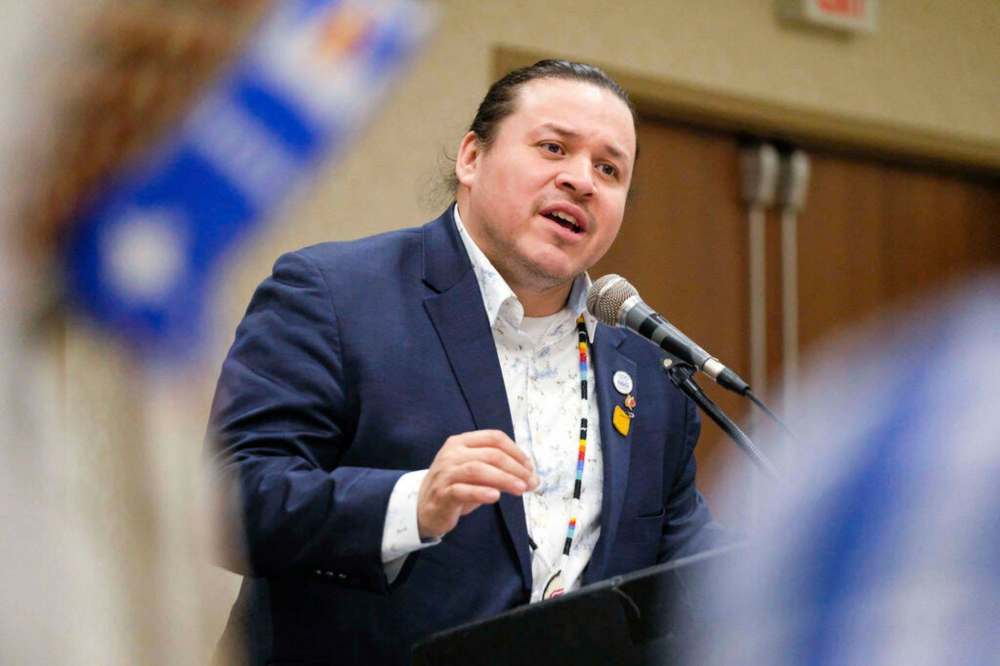Pallister in chiefs’ bad books over vaccine rollout
Advertisement
Read this article for free:
or
Already have an account? Log in here »
To continue reading, please subscribe:
Monthly Digital Subscription
$0 for the first 4 weeks*
- Enjoy unlimited reading on winnipegfreepress.com
- Read the E-Edition, our digital replica newspaper
- Access News Break, our award-winning app
- Play interactive puzzles
*No charge for 4 weeks then price increases to the regular rate of $19.00 plus GST every four weeks. Offer available to new and qualified returning subscribers only. Cancel any time.
Monthly Digital Subscription
$4.75/week*
- Enjoy unlimited reading on winnipegfreepress.com
- Read the E-Edition, our digital replica newspaper
- Access News Break, our award-winning app
- Play interactive puzzles
*Billed as $19 plus GST every four weeks. Cancel any time.
To continue reading, please subscribe:
Add Free Press access to your Brandon Sun subscription for only an additional
$1 for the first 4 weeks*
*Your next subscription payment will increase by $1.00 and you will be charged $16.99 plus GST for four weeks. After four weeks, your payment will increase to $23.99 plus GST every four weeks.
Read unlimited articles for free today:
or
Already have an account? Log in here »
Hey there, time traveller!
This article was published 04/12/2020 (1832 days ago), so information in it may no longer be current.
OTTAWA — Manitoba Premier Brian Pallister says he plans to work with Indigenous leaders to determine who will get the COVID-19 vaccine first, but some chiefs say they won’t even talk to him unless he apologizes for what one deemed race-baiting.
Meanwhile, on Friday, federal officials and an advisory panel failed to clarify the number of vaccine doses Manitoba will receive, including how many will be set aside for Indigenous people.
“I have no interest in meeting with a premier who race-baits and plays loosely with the intergovernmental relationships that directly affect the people I represent,” Southern Grand Chief Jerry Daniels wrote in a release.

“If Brian Pallister truly wants the input of First Nations, then I expect nothing less than a full public apology for the harm he caused this week.”
The premier’s office said Pallister is trying to get details from Ottawa, and wants Indigenous people to be protected from COVID-19.
On Tuesday, Pallister warned that Indigenous people who live in cities such as Winnipeg might inundate remote First Nations to get vaccinated. He decried the lack of detail given by the federal government about how it will prioritize Indigenous communities.
That drew criticism from chiefs. On Thursday, Pallister doubled down and warned Ottawa’s vaccine plan could put “Manitoba at the back of the line,” because it has the highest proportion of Indigenous people.
The premier fears Ottawa will hand out vaccines to provinces on a per-capita basis, and oblige them to immunize Indigenous people, leaving fewer doses for groups like non-Indigenous elderly people.
Federal officials insisted individual provinces will decide the order of who gets vaccinated. They wouldn’t say if Ottawa will impose any conditions on provinces.
The federal government has a constitutional duty to provide health care to Indigenous people who live on reserves and Inuit people.
Courts have said Ottawa also has a special duty to off-reserve First Nations, Métis people and Indigenous people who lack official Indian Act status. Roughly 90,000 people from those groups live in Winnipeg.
Pallister’s office said that’s why he has sought answers from the Trudeau government.
“The premier was completely clear in his remarks: the federal government needs to step up and protect our Indigenous communities first,” wrote a spokeswoman, noting outbreaks in First Nations communities as well as in personal care homes across Manitoba.
“We continue to call on the federal government to establish a dedicated allocation of vaccines for First Nations across Canada that does not negatively impact the overall allocation of vaccines across the country,” the spokeswoman wrote.
There was no mention of an apology from Pallister.
Health Minister Patty Hajdu did not offer much clarity on Friday, but seemed to suggest Ottawa would dedicate some of the supply to First Nations reserves.
“Obviously there a federal role to play, in protecting a certain amount of (vaccines) for federal populations that we’re responsible for,” Hajdu told reporters.
Similarly, Prime Minister Justin Trudeau refused to say how reserves fit into the vaccine rollout, saying only that guidance had been published, and “it will be up to provinces to apply those guidelines.”
He was referring to an arm’s-length advisory body that listed four priority groups.
The four categories are: residents and staff of personal care homes, older adults (starting with those aged 80 and older), health-care workers and “adults in Indigenous communities where infection can have disproportionate consequences.”
People aged 75 up would follow those four categories “as supply becomes available,” followed by those 70 and older.
The guidance notes remote Indigenous communities face a higher risk of death and “societal disruption,” but does not limit its Indigenous category to First Nations reserves. The guidance lists Métis and Inuit people, and notes Indigenous people in cities have difficulty accessing medical services.
“These populations may be considered for immunization concurrent with remote and isolated Indigenous communities, if feasibly identified within jurisdictions,” reads the document from the National Advisory Committee on Immunization.
dylan.robertson@freepress.mb.ca


